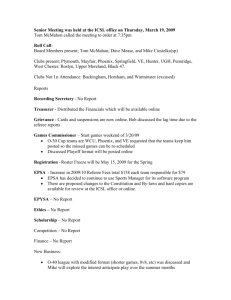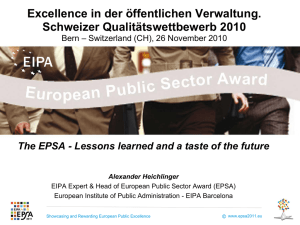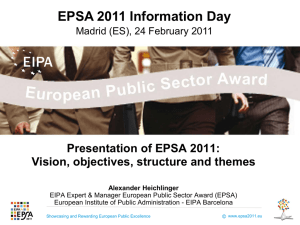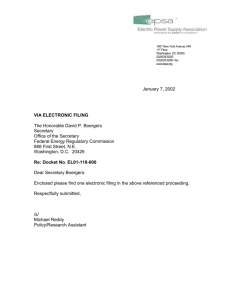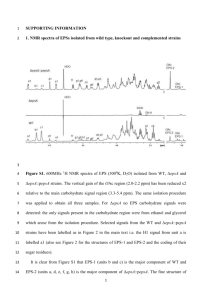The EPSA 2011
advertisement
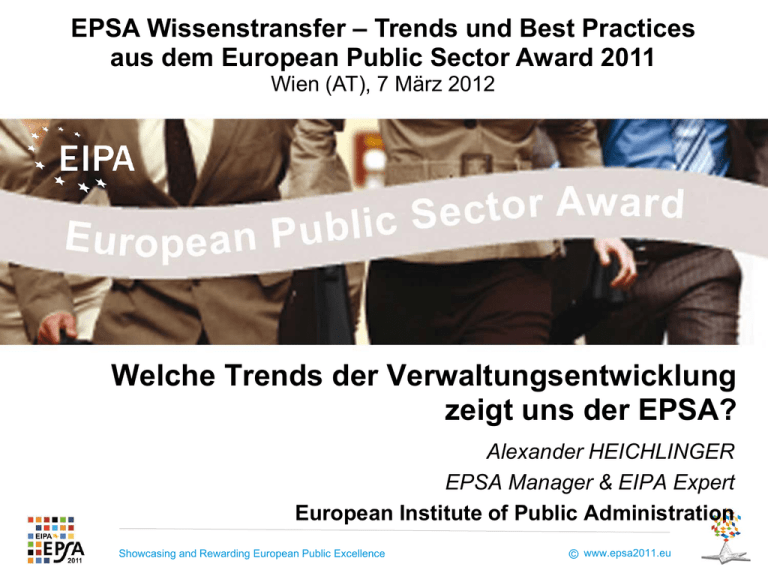
EPSA Wissenstransfer – Trends und Best Practices aus dem European Public Sector Award 2011 Wien (AT), 7 März 2012 Welche Trends der Verwaltungsentwicklung zeigt uns der EPSA? Alexander HEICHLINGER EPSA Manager & EIPA Expert European Institute of Public Administration Showcasing and Rewarding European Public Excellence © www.epsa2011.eu The European Public Sector Award... More than just and award! The EPSA brings together the best, most innovative and efficient performers from the European public sector. By highlighting exemplary models of innovative public performance, the award serves as a catalyst for continued progress in addressing Europe’s most pressing concerns. Tool for disseminating new problem-solving models and for supporting the EU 2020 strategy for a smart, sustainable and inclusive growth. Vision: To create an arena in which Europe’s public sector institutions can excel and become an exemplar for the rest of the world. © www.epsa2011.eu The EPSA 2011 Institutional (Co-financing) Partners EU InsrtCommission your own text here Austria Cyprus Denmark Germany Hungary Italy Luxembourg Insert your own text here The Netherlands Poland Spain Switzerland With the support of: Private Sponsors: © www.epsa2011.eu EPSA 2011 Final Conference & Award Ceremony Maastricht (NL), 15 – 17 November 2011 © www.epsa2011.eu The EPSA 2011 – Overview of General Results In total, more than 350 European public organisations have registered on the EPSA online system; 274 applications have finally been submitted and were eligible; Applications were received from 32 European countries and 7 from EU institutions; Among the "top submitters" were countries such as Spain, Romania, Austria, Italy, Poland and Germany. © www.epsa2011.eu Applications per Country Albania Austria Belgium Bulgaria Croatia Cyprus Czech Republic Denmark Estonia Finland France FYR Macedonia Germany Greece Hungary Ireland Italy 1 24 10 8 3 3 1 4 3 3 2 1 19 2 8 8 23 Lithuania Malta Netherlands Norway Poland Portugal Romania Slovakia Slovenia Spain Sweden Switzerland Turkey Ukraine United Kingdom EU Institutions TOTAL 2 2 7 3 21 11 30 1 1 47 1 11 2 1 4 7 274 © www.epsa2011.eu Applications by Administrative Level Local: 116 Regional: 66 National: 85 EU Institutions: 7 Total: © www.epsa2011.eu 274 Applications by Thematic Area Theme 1: 103 Theme 2: 115 Theme 3: 56 Total: 274 © www.epsa2011.eu EPSA 2011 Themes Theme I Smart Public Service Delivery in a Cold Economic Climate Related to key aspects of Europe’s crisis, i.e. stabilising public finances Innovation in how services are delivered Improving services at the same or lower cost Maintaining diversity in and quality of service objectives while reducing costs Redefined service at significant lower cost level Better measurement of service delivery Imaginative performance measurement linked to service objectives Theme II Opening Up the Public Sector Through Collaborative Governance Enhancing openness, transparency and accountability of governments and public administrations Prepare citizens through openness (access to information and ICT systems) to take part in decisionmaking processes Match between the involvement objectives and those of the policy area Collaborative way of working has to contribute tangibly to the service delivery objectives, evidence has to be provided Provide evidence that the new way of working justifies the opportunity cost of the resources devoted to collaborative governance © www.epsa2011.eu EPSA 2011 Themes Theme III Going Green: Concrete Solutions from the Public Sector Projects relating to the enforcement of environmental legislation and implementation of policy goals Innovative solutions for reaching environmental objectives of legislation (waste, air, etc.) Solutions for the stimulation of a greener economy (econ. instruments, information campaigns) Internal environmental management by public administrations New approach to environmental management systems Innovative procurement practices Internal energy or transport concepts Greening public companies © www.epsa2011.eu Theme 1 Key messages and trends Need for a successful strategic framework for budget & services reform What public expenditure level is sustainable? What level of public delivery is acceptable? service Clarity of objectives (linked to ability to set priorities) Need to secure a wider consensus for the decisions to be made by PA. Co-design and production of services by users and selfmanagement of the outcomes (e.g. in personalised services such as health care). Importance of commitment at all levels for reform processes Budgeting and service reviews are, in the end, political decisions, so political support is essential. A fully-fledged process of reform in a public administration works better when it engages those responsible for making it work at middle management and operational level (bottom-up approach), rather than being imposed on a top-down basis. © www.epsa2011.eu Theme 1 Key messages and trends Importance of size and level of government Successful processes happen at all levels of government and in different political systems; No indication or evidence per se that such reviews or reforms are easier or more difficult in a specific form of governmental structure (centralized, decentralized etc.) Questions rise about the extent to which smaller sub-national entities are likely to have resources to pursue reforms. Importance of technological innovation in service reform Technological innovation can result in significant improvements in service delivery standards and/or reduced costs. In considering innovation, public authorities should actively seek out good practice from other public authorities, i.e effective adaptation to local circumstances of good practice from other sources can be as effective as the search for ideas not previously applied elsewhere. © www.epsa2011.eu Theme 2 Key messages and trends Opening up certain areas of processes to citizens Active use of new social media & transparent communication Social Integration Collaboration benefits all parties. The use of the internet is the most significant element in facilitating the overall aim of transparency. Showing initiative to integrate specific social groups within the general public takes the idea of collaborative governance even further. The general trend concerning benefits for the PS are budget and administration. This grants greater influence to active involvement of citizens and more generally, the private sector. It also results in greater administrative efficiency, as well as the financial benefits of not having to allocate as many resources to a particular area or process. Access to information brings citizens into decision-making process. New technologies also simplify processes, thereby increasing efficiency and reducing administrative costs. Increased trust in the public sector as another result. Encouraging collaboration at all levels of society and ensuring that all are included and can benefit from this partnership enhances social inclusion. Working together towards a common goal, creates ownership and increases outcome acceptance. © www.epsa2011.eu Theme 2 Key messages and trends Ownership The ownership of decisions and processes shifts from governmental bodies to individuals or collective groups of private stakeholders. The responsibility of decision makers does not change, only the level of openness. Acceptance, ownership and quality of democracy are thus secured. Border lines between private and public sector have weakened. Make lessons transferable – through evaluation Measuring and evaluating outcome is essential when it comes to transferring knowledge. Challenges related to performance measurement are linked to expectations and CBAs. Problems become obvious when it comes to measuring the political benefits of projects. Satisfaction, disappointment and mistrust cannot be measured, but are felt during public processes. © www.epsa2011.eu Theme 3 Key messages and trends Innovation builds on continuation at the municipal level ’Branding’: an important awareness-raising tool Front-runner projects from very ambitious municipalities with longterm sustainable development and low-carbon economy programmes indicate that long-term expertise and administrative capacities are major preconditions for successful greening policies. Communication and awareness raising are important elements of many initiatives in the field of greening or sustainable development. Membership to a regional or local network very much improves the quality of the initiatives. Best practices in this theme could stimulate a broader debate as to whether there is often a need for more expertise in the field of successful communication. Innovation needs continuation and a strong exchange with other administrations. ‘Branding’ can be an essential element of a communication strategy. © www.epsa2011.eu Theme 3 Key messages and trends Long-term partnerships by including interests in the project design Need to find good partners in the business sector or in civil society at all levels, especially for consultation and information purposes. Finding the right partners is also very essential for subsidy programmes where parties can apply for funds. Many administrations today face tremendous financial problems, so it is worth thinking about possibilities to start projects without funds. The role of initiator and motivator is certainly different to the normal routine of administrations. Ownership as a core to real changes in administration There is very often political leadership in this field and general acceptance to change administrative routines. Greening the practices is more difficult in other parts of the administration. The stimulation of green procurement or the introduction of EMS systems within all departments is still a major challenge in the EU at all levels. ‘Greening’ is possible with an intelligent participatory strategy. The core element has been ownership. © www.epsa2011.eu EPSA 2011 Publications © www.epsa2011.eu The EPSA 2011 Team © www.epsa2011.eu Contact address Alexander Heichlinger (AT) EIPA Expert & Head European Public Sector Award (EPSA) EIPA-ECR Barcelona Tel.: +34 93 567 24 04 E-mail: a.heichlinger@eipa.eu Visit our web-pages at: www.eipa.eu; www.epsa2011.eu; © www.epsa2011.eu
